Aboard American Airlines Flight 109
Ranger Rick Retires
Ranger Rick lied. He didn't go home last week. In fact, he didn't come close to getting home last week.
Mmmm. Ok.
Last week I was invited to speak at a conference of Air Force Public Affairs Officers in the region. "The region" includes that portion of the planet which falls under the jurisdiction of Central Command which, according to its web page, "includes 27 culturally and economically diverse nations located throughout the Horn of Africa, South and Central Asia, and the Northern Red Sea regions, as well as the Arabian Peninsula and Iraq."
This is the same place I was in January when I could only describe it as "A Desert Base in Southwest Asia" in Chapter 11: "Near a War Zone; In a War Zone" in January.
Major Foss was to deliver the bulk of the briefing and I was to tie up loose ends. Of course, because she is had worked on the presentation for days on end (as opposed to my usual mechanism of deciding what I'm going to say while I'm being introduced) by the time she was finished there were no loose ends to tie up.
I didn't want to have shlepped all the way to this Desert Base in Southwest Asia without saying anything so I became the luncheon speaker instead.
SIDEBAR:
Another such officer is Lt. Col. Mike Ceroli. Close readers will remember that Col. Ceroli runs the Psychological Operations battalion in the Centcom area of operations. If he stays in the military he will, one day, be General Ceroli.
The PsyOps battalion was my personal taxi service as I made my way through the nooks and crannies of Iraq. I liked them because I understood exactly what they did. They liked me because I was the easiest lift for a civilian many of them had ever met: I showed up on time. I came prepared for the appropriate weather. I had my own gun, and I would carry an M-16 to help with convoy defense.
The afternoon before I left Baghdad, the PsyOps battalion honored me by presenting me with a certificate of appreciation and an American flag which flew over their compound. It will fly, with great pride, over Mullings Central on national holidays.
If officers like Foss and Ceroli are the future of the US military, then the nation is going to be in safe hands, indeed. END SIDEBAR
To be fair to General Roggero this photo was taken before he had any idea what kinds of trouble I am capable of getting into.
If we have learned anything during this adventure it is this: Good ideas are as grains of sand in the desert; they are as stars in the night sky; they gleam in the sun and they shine in the night �
Right.
Actually, one of the important lessons I have learned here is: Just because I have an idea, it doesn't necessarily mean it is a good idea.
Nevertheless, this was a good idea but I needed the help of two people to make it work. One was Brigadier General Mark Kimmitt of whom I've written before.
General Kimmitt and I came into Baghdad within hours of one another and hit it off immediately. We have been allies and, more importantly, friends throughout my six month stay. From the first day to the last, I could count on General Kimmitt to be watching out for me both organizationally and physically.
Kimmitt is an artillery officer who was pressed into service to be the spokesman for the military during Operation Iraqi Freedom. He wears his gun during briefings because I felt it was useful to draw as stark a visual distinction as possible between the military role and the civilian role as portrayed by Ambassador Bremer's spokesman, Dan Senor.
Some people - many people - disagreed with that decision. But Kimmitt is a warrior and his weapon is as a big a part of his of his persona as his wit and his intellect. Six months on, I would make the same decision again.
The other officer who got the responsibility of making this thing work was Col. Dave Thurston.
Thurston is the other end of the scale from Foss and Ceroli - and on another scale, Kimmitt. Dave Thurston has just celebrated his 40th year of service in the United States Air Force.
Now, a full Colonel, he has been through the entire range of changes in the world from Vietnam to Iraq. As Airman 1st Class JG Buzanowski wrote in a piece celebrating Col. Thurston's 40th anniversary, "When Dave Thurston joint the Air Force there had been no moon landing, the SR-71 hadn't yet flown, the Vietnam war was just beginning, and postage stamps cost a nickel."
Dave Thurston didn't stamp his feet, or yell, or threaten, or pressure. He just kept, as we like to say, leaning forward until he got the desired effect.
Dave Thurston, and Mark Kimmitt are bookends when it comes to having helped create the environment which allow officers like Major Foss and Lt. Col. Ceroli to flourish in service to our nation.
On my way out of Baghdad I did a few things I had been meaning to do, but had never gotten around to. One was to visit Uday's lions which are located � somewhere.
Here is Ranger Rick having a conversation with one of them. I think we were talking about whether the word, "Crikey" has any real meaning in the African veldt, or if it's just a TV word.
In addition to the lions, if which there are eight, I was also interested in the warning sign which hung on the fence. Note the fourth item:
Then there was this sign which was fairly new.
Combat Stress are the folks who deal with soldiers and civilians who are having trouble coping with the pressures on them in a war zone. They deal with everything from what we used to call battle fatigue, to helping young men and women cope with having watched their colleague die from a bullet or an explosive device.
These are very, very tough soldiers. The fact that they are psychologists, psychiatrists, nurses and aides doesn't make them any less tough.
Nevertheless, sign-painters they ain't.
On the yin and the yang front, I went out to find the hole in the parking lot which was created by the rocket attack which I endured during my first week.
One night British Col. Ian Tunnicliff and I were standing just about in this spot when we heard a terrific explosion.
As I may have explained previously, you judge the size of the device by its volume; and its location by the time and strength of the concussion wave.
In this case it was a large explosion downtown, but the concussion was blocked by the palace itself, so Col. Ian and I simply walked under a concrete shelter and continued our conversation.
Bomb craters and pool reflections are the two edges of my memories of Baghdad.
When I got home, I got to do the sorts of thing which make Washington, DC, Washington, DC.
For instance, I went I went to the White House to say "hey" and as I was walking out passed the place where the TV reporters do their stand-ups, I asked a photographer to take this.
SIDEBAR: I wasn't, of course.
I would have put up with the bickering and squabbling of the White House press corps for about seven minutes until I stalked away from the lectern, walked out of the room, went back to my office and picked up the phone which, by that time, would have been ringing in the news that my services would no longer be required. Notwithstanding I would not be a good at dealing with the White House press corps, another thing we got to do after I got home was to eat with about 3,000 of them at the annual White House Correspondents' Dinner. This is what Ranger Rick looks like when he's not wearing his body armor:
But the best thing that I got to do when I got home was this:
The Lad, the Ladette, the Mullings Director of Standards & Practices and me. Together. Having dinner.
My friend Don Hamilton and I spoke often of the St. Crispen's day speech in Shakespeare's Henry V. Occassionally, in fact, we would watch the DVD of the Kenneth Branaugh version.
Here is the end of that speech which has a depth of meaning to me I never would have believed possible six months ago. It is with this quote that the reports of my Iraq adventures will, fittingly, end:
Be safe.
Note: The Iraq Travelogue emails are distributed through the services of Focus Data Solutions, Inc.
Click here to return to the Mullings page
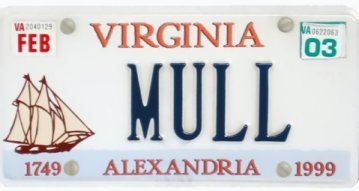


Chapter 24: Ranger Rick Retires
Sunday, May 2, 2004
and
Alexandria, Virginia Dear Mr. Mullings:
Please don't do this third-person thing. It's annoying and about half the time you forget and start writing in the first person anyway.
signed,
The National Association of People with Dissociative Disorders (NAPDD - DDPAN) 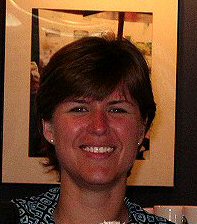 My presentation was supposed to be a co-presentation with Major Claudia Foss who is a real Air Force public affairs officer and who will have been in Iraq for just as long as me by the time she leaves in mid-may.
My presentation was supposed to be a co-presentation with Major Claudia Foss who is a real Air Force public affairs officer and who will have been in Iraq for just as long as me by the time she leaves in mid-may.
Major Foss is typical of many of the mid-career officers I have met here. They are relatively young - at least when compared to Ranger Rick - they are astoundingly dedicated, wonderful leaders, and terrific friends.
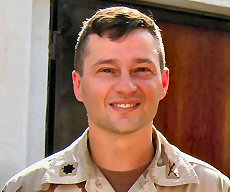
It was with Mike and his team that I made that trip to Fallujah you read about in Chapter 15.
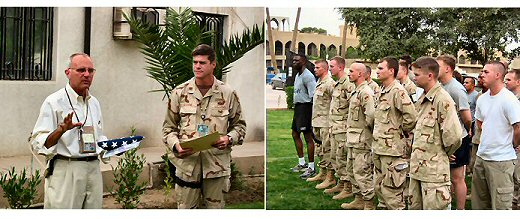 The officer next to me is Major H. Byrne, the director of operations for the battalion. "H," has he is known to one and all, is an intellectual who absorbs information like a sponge and processes it into breathtakingly intuitive concepts which he can then explain in a manner such that even someone such as me understands its importance.
The officer next to me is Major H. Byrne, the director of operations for the battalion. "H," has he is known to one and all, is an intellectual who absorbs information like a sponge and processes it into breathtakingly intuitive concepts which he can then explain in a manner such that even someone such as me understands its importance.
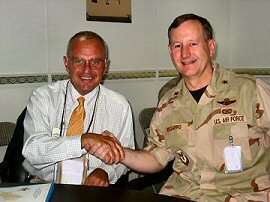
That night, while chatting with Brigadier General Fred Roggero who sits atop the Air Force public affairs pyramid, I had an idea; General Roggero thought it was a good idea; so, I volunteered to stick around for a couple of days to implement the good idea.
Hey! Khalil Gibran. Wanna get back to the story?
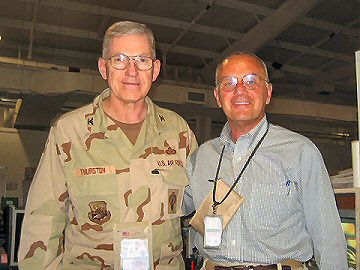 Thurston came into the military as an enlisted man in 1964, rose to having been selected as a Master Sergeant, spent 12 years in night school getting a college degree, went to Officer Training School, and started up the officers' ladder as a new Second Lieutenant.
Thurston came into the military as an enlisted man in 1964, rose to having been selected as a Master Sergeant, spent 12 years in night school getting a college degree, went to Officer Training School, and started up the officers' ladder as a new Second Lieutenant.
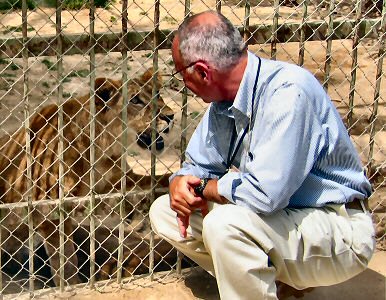
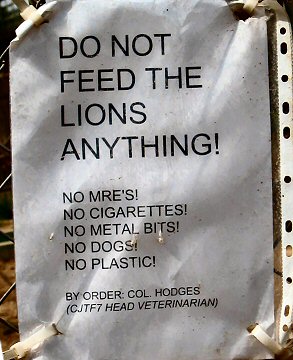
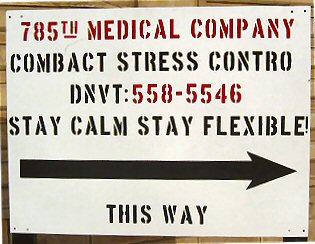 Note the spelling of the first and third words on the second line, and imagine the stress level of the guy with the stencil when he realized the exclamation point wasn't going to fit on the fourth line.
Note the spelling of the first and third words on the second line, and imagine the stress level of the guy with the stencil when he realized the exclamation point wasn't going to fit on the fourth line.
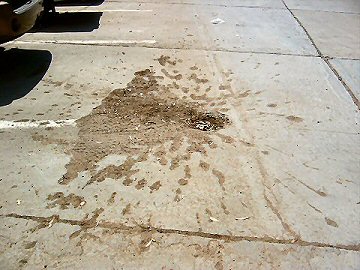
Back in November, I thought rocket and mortar attacks were part of the adventure. By April, when the whistle of a weapon passing over my trailer woke me up leaving me to clench my teeth and grab the sides of my bed waiting for the explosion, they weren't nearly as amusing.
On the other side of the coin - and on the other side of the palace - was this:
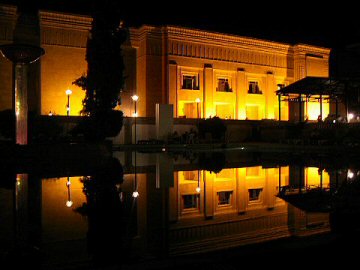
This is a photo of the palace at night and its reflection in the swimming pool.
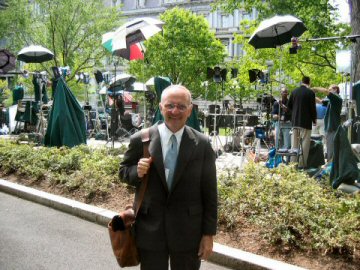
Shortly after Ari Fleischer announced he was retiring, we conspired to have me show up at one of the midday briefings. I got to the briefing room just before he started, stood along the wall during, and left right after. By that afternoon the buzz was out all over Washington that I was being considered to replace Ari as White House Press Secretary.
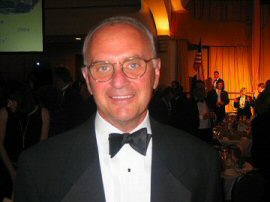
What you can't tell from this shot is that when I tried my tuxedo on in the afternoon the pants dropped right to the floor because of the amount of weight I had lost, so I had to run out and buy suspenders. Nevertheless the jacket looked like I had borrowed it from my father and my father had been a Sumo wrestler.
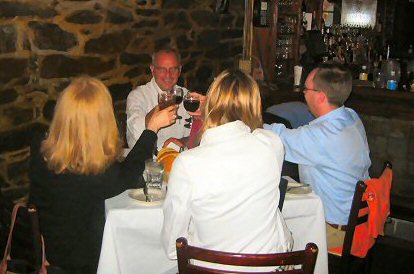
This story shall the good man teach his son;
And Crispin Crispian shall ne'er go by,
From this day to the ending of the world,
But we in it shall be remembered-
We few, we happy few, we band of brothers;
For he to-day that sheds his blood with me
Shall be my brother; be he ne'er so vile,
This day shall gentle his condition;
And gentlemen in England now-a-bed
Shall think themselves accurs'd they were not here,
And hold their manhoods cheap whiles any speaks
That fought with us upon Saint Crispin's day.